TOU306 Project: Assessing Bhutan's Regional Tourism and Perceptions
VerifiedAdded on 2022/10/08
|14
|3198
|51
Report
AI Summary
This report is a literature review that explores Bhutan's tourism industry, particularly focusing on regional tourism and its impacts, along with the perceptions of local stakeholders. The study examines Bhutan's tourism policy, guided by the Gross National Happiness (GNH) strategy, and assesses how the implementation of tourism policy is characterized by diverse stakeholder power dynamics. It investigates the rise of ecotourism and its influence on socio-economic changes, especially among the youth. The report also analyzes the role of cultural authenticity, spirituality, and happiness in attracting tourists. It further discusses the social exchange theory in relation to local support for tourism and examines the impact of mass tourism, highlighting associated challenges like unrealized expectations and functional incompleteness. The research methodology, including a literature review approach with specific search strategies and inclusion/exclusion criteria, is detailed. The annotated bibliography provides summaries of key articles focusing on tourism's impact on religious festivals, the effects of tourism on remote areas like Merak–Sakteng, and the governance of sustainable tourism in Bhutan. The report also examines the challenges posed by unregulated mass tourism and its impacts on the environment and local communities.
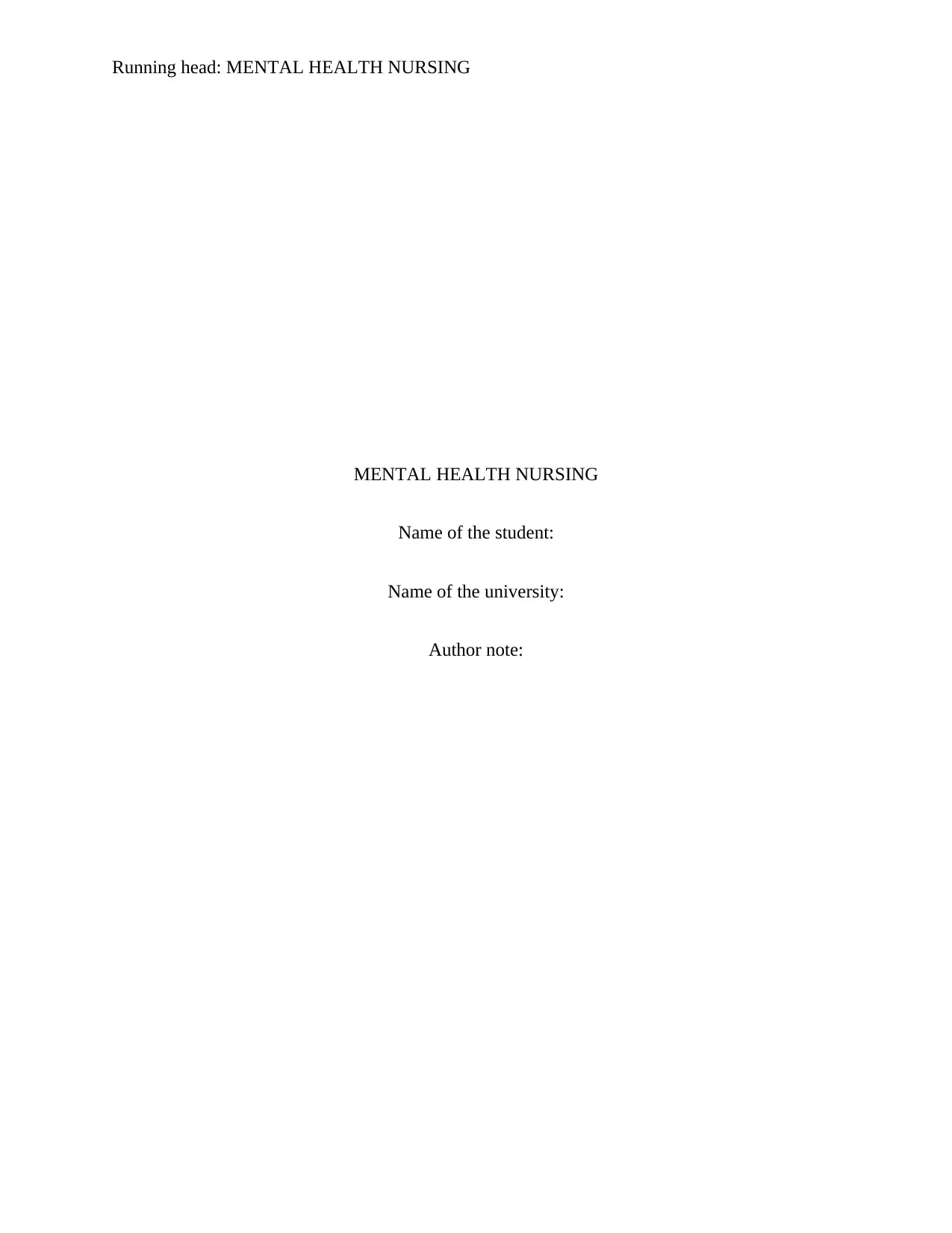
Running head: MENTAL HEALTH NURSING
MENTAL HEALTH NURSING
Name of the student:
Name of the university:
Author note:
MENTAL HEALTH NURSING
Name of the student:
Name of the university:
Author note:
Paraphrase This Document
Need a fresh take? Get an instant paraphrase of this document with our AI Paraphraser
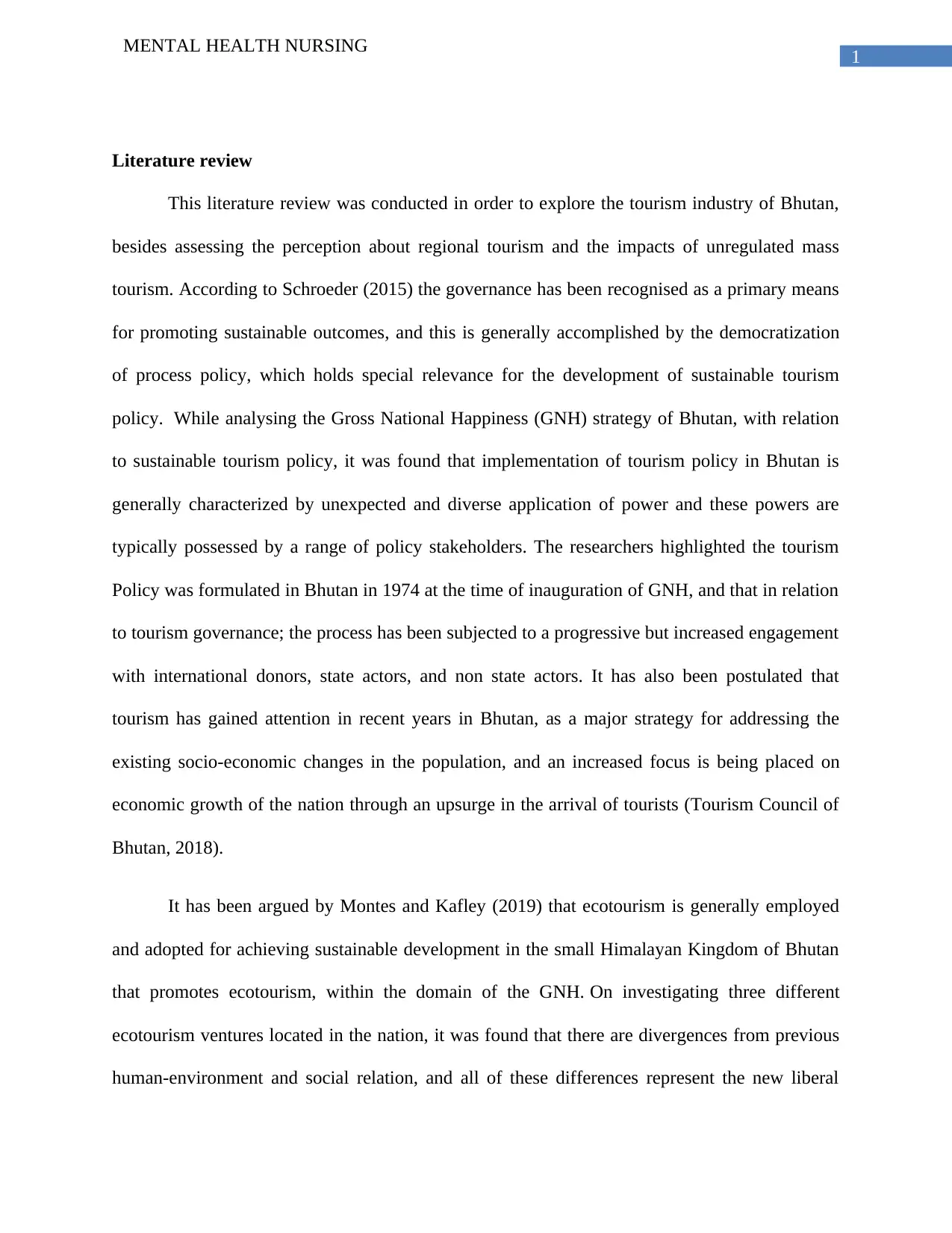
1
MENTAL HEALTH NURSING
Literature review
This literature review was conducted in order to explore the tourism industry of Bhutan,
besides assessing the perception about regional tourism and the impacts of unregulated mass
tourism. According to Schroeder (2015) the governance has been recognised as a primary means
for promoting sustainable outcomes, and this is generally accomplished by the democratization
of process policy, which holds special relevance for the development of sustainable tourism
policy. While analysing the Gross National Happiness (GNH) strategy of Bhutan, with relation
to sustainable tourism policy, it was found that implementation of tourism policy in Bhutan is
generally characterized by unexpected and diverse application of power and these powers are
typically possessed by a range of policy stakeholders. The researchers highlighted the tourism
Policy was formulated in Bhutan in 1974 at the time of inauguration of GNH, and that in relation
to tourism governance; the process has been subjected to a progressive but increased engagement
with international donors, state actors, and non state actors. It has also been postulated that
tourism has gained attention in recent years in Bhutan, as a major strategy for addressing the
existing socio-economic changes in the population, and an increased focus is being placed on
economic growth of the nation through an upsurge in the arrival of tourists (Tourism Council of
Bhutan, 2018).
It has been argued by Montes and Kafley (2019) that ecotourism is generally employed
and adopted for achieving sustainable development in the small Himalayan Kingdom of Bhutan
that promotes ecotourism, within the domain of the GNH. On investigating three different
ecotourism ventures located in the nation, it was found that there are divergences from previous
human-environment and social relation, and all of these differences represent the new liberal
MENTAL HEALTH NURSING
Literature review
This literature review was conducted in order to explore the tourism industry of Bhutan,
besides assessing the perception about regional tourism and the impacts of unregulated mass
tourism. According to Schroeder (2015) the governance has been recognised as a primary means
for promoting sustainable outcomes, and this is generally accomplished by the democratization
of process policy, which holds special relevance for the development of sustainable tourism
policy. While analysing the Gross National Happiness (GNH) strategy of Bhutan, with relation
to sustainable tourism policy, it was found that implementation of tourism policy in Bhutan is
generally characterized by unexpected and diverse application of power and these powers are
typically possessed by a range of policy stakeholders. The researchers highlighted the tourism
Policy was formulated in Bhutan in 1974 at the time of inauguration of GNH, and that in relation
to tourism governance; the process has been subjected to a progressive but increased engagement
with international donors, state actors, and non state actors. It has also been postulated that
tourism has gained attention in recent years in Bhutan, as a major strategy for addressing the
existing socio-economic changes in the population, and an increased focus is being placed on
economic growth of the nation through an upsurge in the arrival of tourists (Tourism Council of
Bhutan, 2018).
It has been argued by Montes and Kafley (2019) that ecotourism is generally employed
and adopted for achieving sustainable development in the small Himalayan Kingdom of Bhutan
that promotes ecotourism, within the domain of the GNH. On investigating three different
ecotourism ventures located in the nation, it was found that there are divergences from previous
human-environment and social relation, and all of these differences represent the new liberal
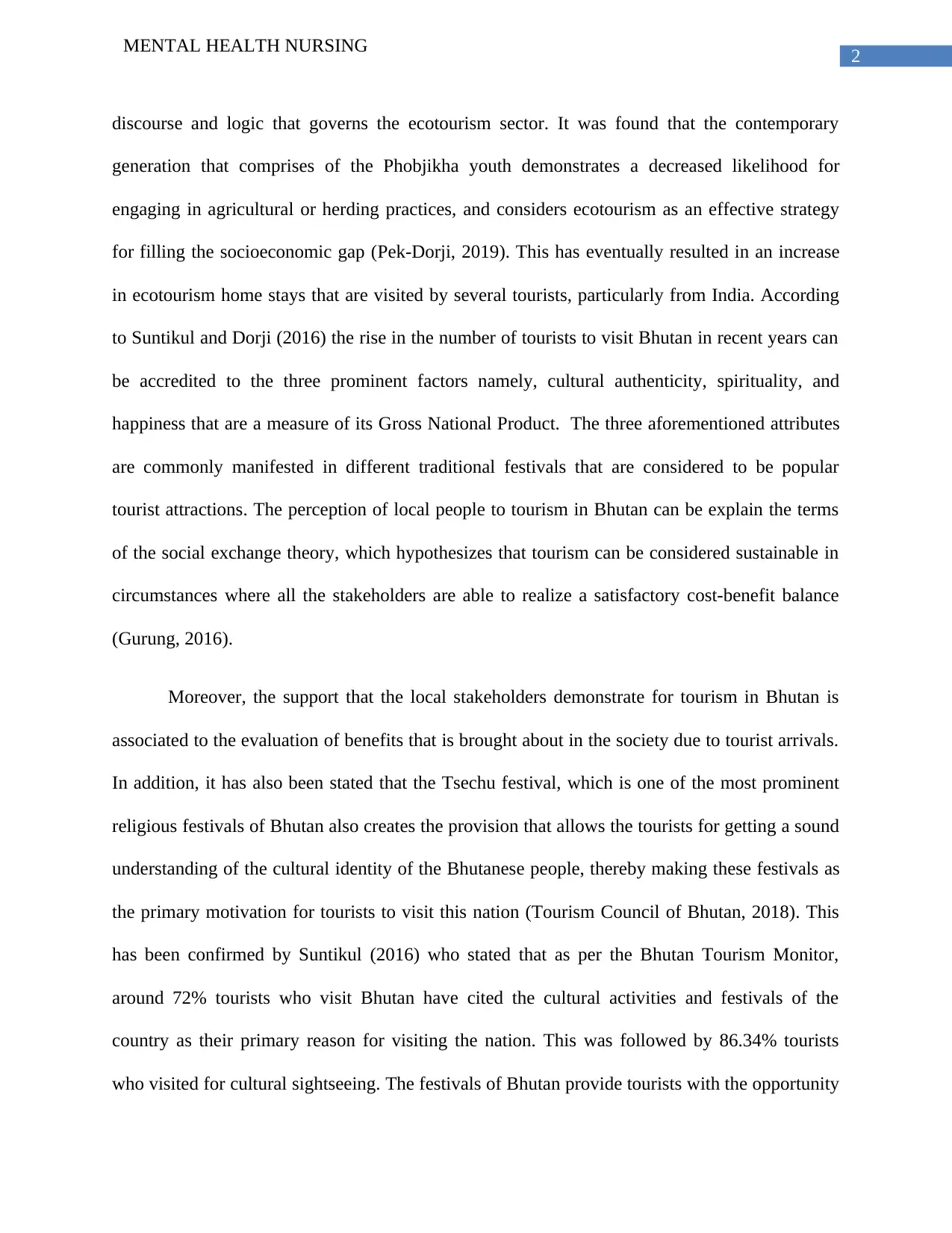
2
MENTAL HEALTH NURSING
discourse and logic that governs the ecotourism sector. It was found that the contemporary
generation that comprises of the Phobjikha youth demonstrates a decreased likelihood for
engaging in agricultural or herding practices, and considers ecotourism as an effective strategy
for filling the socioeconomic gap (Pek-Dorji, 2019). This has eventually resulted in an increase
in ecotourism home stays that are visited by several tourists, particularly from India. According
to Suntikul and Dorji (2016) the rise in the number of tourists to visit Bhutan in recent years can
be accredited to the three prominent factors namely, cultural authenticity, spirituality, and
happiness that are a measure of its Gross National Product. The three aforementioned attributes
are commonly manifested in different traditional festivals that are considered to be popular
tourist attractions. The perception of local people to tourism in Bhutan can be explain the terms
of the social exchange theory, which hypothesizes that tourism can be considered sustainable in
circumstances where all the stakeholders are able to realize a satisfactory cost-benefit balance
(Gurung, 2016).
Moreover, the support that the local stakeholders demonstrate for tourism in Bhutan is
associated to the evaluation of benefits that is brought about in the society due to tourist arrivals.
In addition, it has also been stated that the Tsechu festival, which is one of the most prominent
religious festivals of Bhutan also creates the provision that allows the tourists for getting a sound
understanding of the cultural identity of the Bhutanese people, thereby making these festivals as
the primary motivation for tourists to visit this nation (Tourism Council of Bhutan, 2018). This
has been confirmed by Suntikul (2016) who stated that as per the Bhutan Tourism Monitor,
around 72% tourists who visit Bhutan have cited the cultural activities and festivals of the
country as their primary reason for visiting the nation. This was followed by 86.34% tourists
who visited for cultural sightseeing. The festivals of Bhutan provide tourists with the opportunity
MENTAL HEALTH NURSING
discourse and logic that governs the ecotourism sector. It was found that the contemporary
generation that comprises of the Phobjikha youth demonstrates a decreased likelihood for
engaging in agricultural or herding practices, and considers ecotourism as an effective strategy
for filling the socioeconomic gap (Pek-Dorji, 2019). This has eventually resulted in an increase
in ecotourism home stays that are visited by several tourists, particularly from India. According
to Suntikul and Dorji (2016) the rise in the number of tourists to visit Bhutan in recent years can
be accredited to the three prominent factors namely, cultural authenticity, spirituality, and
happiness that are a measure of its Gross National Product. The three aforementioned attributes
are commonly manifested in different traditional festivals that are considered to be popular
tourist attractions. The perception of local people to tourism in Bhutan can be explain the terms
of the social exchange theory, which hypothesizes that tourism can be considered sustainable in
circumstances where all the stakeholders are able to realize a satisfactory cost-benefit balance
(Gurung, 2016).
Moreover, the support that the local stakeholders demonstrate for tourism in Bhutan is
associated to the evaluation of benefits that is brought about in the society due to tourist arrivals.
In addition, it has also been stated that the Tsechu festival, which is one of the most prominent
religious festivals of Bhutan also creates the provision that allows the tourists for getting a sound
understanding of the cultural identity of the Bhutanese people, thereby making these festivals as
the primary motivation for tourists to visit this nation (Tourism Council of Bhutan, 2018). This
has been confirmed by Suntikul (2016) who stated that as per the Bhutan Tourism Monitor,
around 72% tourists who visit Bhutan have cited the cultural activities and festivals of the
country as their primary reason for visiting the nation. This was followed by 86.34% tourists
who visited for cultural sightseeing. The festivals of Bhutan provide tourists with the opportunity
⊘ This is a preview!⊘
Do you want full access?
Subscribe today to unlock all pages.

Trusted by 1+ million students worldwide
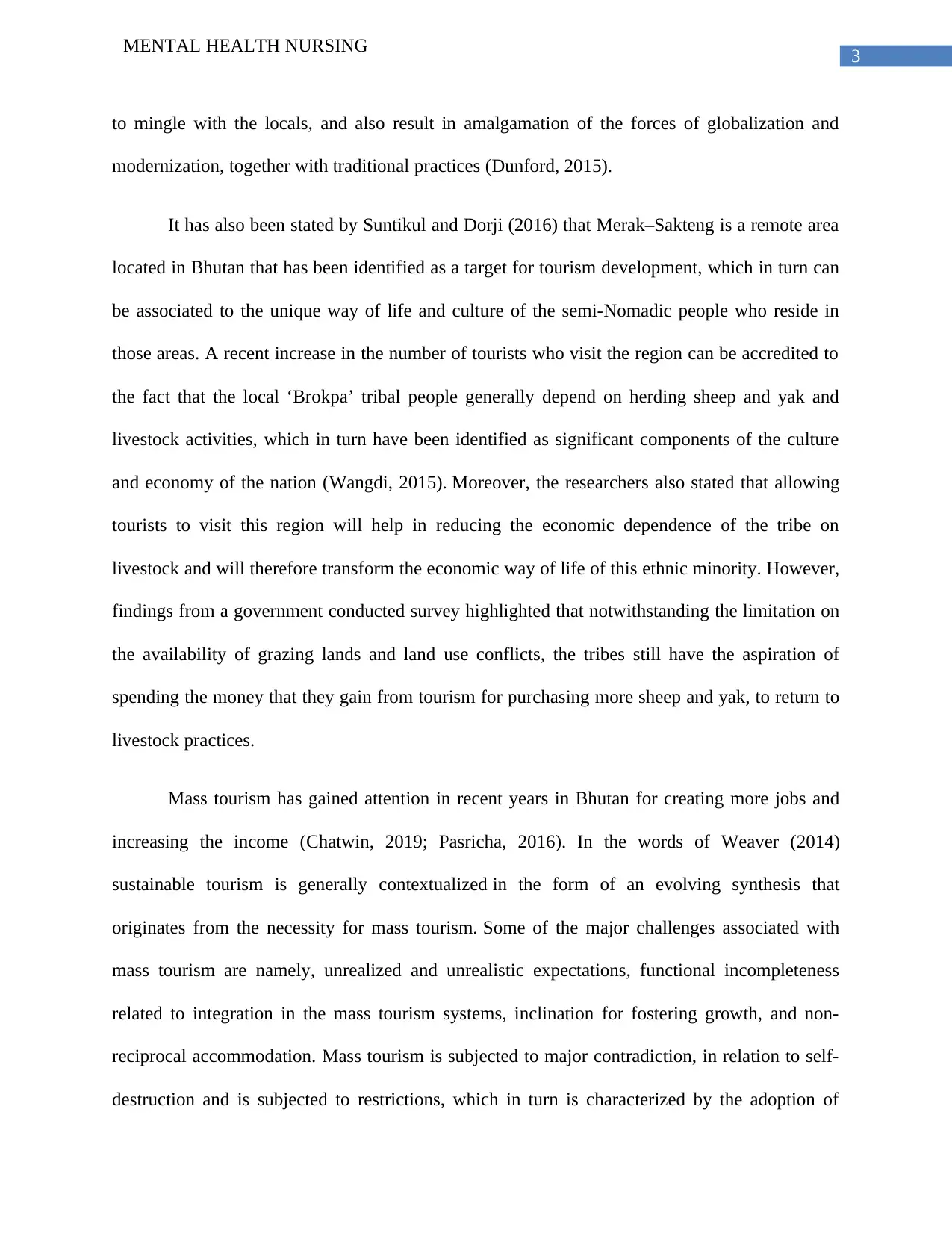
3
MENTAL HEALTH NURSING
to mingle with the locals, and also result in amalgamation of the forces of globalization and
modernization, together with traditional practices (Dunford, 2015).
It has also been stated by Suntikul and Dorji (2016) that Merak–Sakteng is a remote area
located in Bhutan that has been identified as a target for tourism development, which in turn can
be associated to the unique way of life and culture of the semi-Nomadic people who reside in
those areas. A recent increase in the number of tourists who visit the region can be accredited to
the fact that the local ‘Brokpa’ tribal people generally depend on herding sheep and yak and
livestock activities, which in turn have been identified as significant components of the culture
and economy of the nation (Wangdi, 2015). Moreover, the researchers also stated that allowing
tourists to visit this region will help in reducing the economic dependence of the tribe on
livestock and will therefore transform the economic way of life of this ethnic minority. However,
findings from a government conducted survey highlighted that notwithstanding the limitation on
the availability of grazing lands and land use conflicts, the tribes still have the aspiration of
spending the money that they gain from tourism for purchasing more sheep and yak, to return to
livestock practices.
Mass tourism has gained attention in recent years in Bhutan for creating more jobs and
increasing the income (Chatwin, 2019; Pasricha, 2016). In the words of Weaver (2014)
sustainable tourism is generally contextualized in the form of an evolving synthesis that
originates from the necessity for mass tourism. Some of the major challenges associated with
mass tourism are namely, unrealized and unrealistic expectations, functional incompleteness
related to integration in the mass tourism systems, inclination for fostering growth, and non-
reciprocal accommodation. Mass tourism is subjected to major contradiction, in relation to self-
destruction and is subjected to restrictions, which in turn is characterized by the adoption of
MENTAL HEALTH NURSING
to mingle with the locals, and also result in amalgamation of the forces of globalization and
modernization, together with traditional practices (Dunford, 2015).
It has also been stated by Suntikul and Dorji (2016) that Merak–Sakteng is a remote area
located in Bhutan that has been identified as a target for tourism development, which in turn can
be associated to the unique way of life and culture of the semi-Nomadic people who reside in
those areas. A recent increase in the number of tourists who visit the region can be accredited to
the fact that the local ‘Brokpa’ tribal people generally depend on herding sheep and yak and
livestock activities, which in turn have been identified as significant components of the culture
and economy of the nation (Wangdi, 2015). Moreover, the researchers also stated that allowing
tourists to visit this region will help in reducing the economic dependence of the tribe on
livestock and will therefore transform the economic way of life of this ethnic minority. However,
findings from a government conducted survey highlighted that notwithstanding the limitation on
the availability of grazing lands and land use conflicts, the tribes still have the aspiration of
spending the money that they gain from tourism for purchasing more sheep and yak, to return to
livestock practices.
Mass tourism has gained attention in recent years in Bhutan for creating more jobs and
increasing the income (Chatwin, 2019; Pasricha, 2016). In the words of Weaver (2014)
sustainable tourism is generally contextualized in the form of an evolving synthesis that
originates from the necessity for mass tourism. Some of the major challenges associated with
mass tourism are namely, unrealized and unrealistic expectations, functional incompleteness
related to integration in the mass tourism systems, inclination for fostering growth, and non-
reciprocal accommodation. Mass tourism is subjected to major contradiction, in relation to self-
destruction and is subjected to restrictions, which in turn is characterized by the adoption of
Paraphrase This Document
Need a fresh take? Get an instant paraphrase of this document with our AI Paraphraser
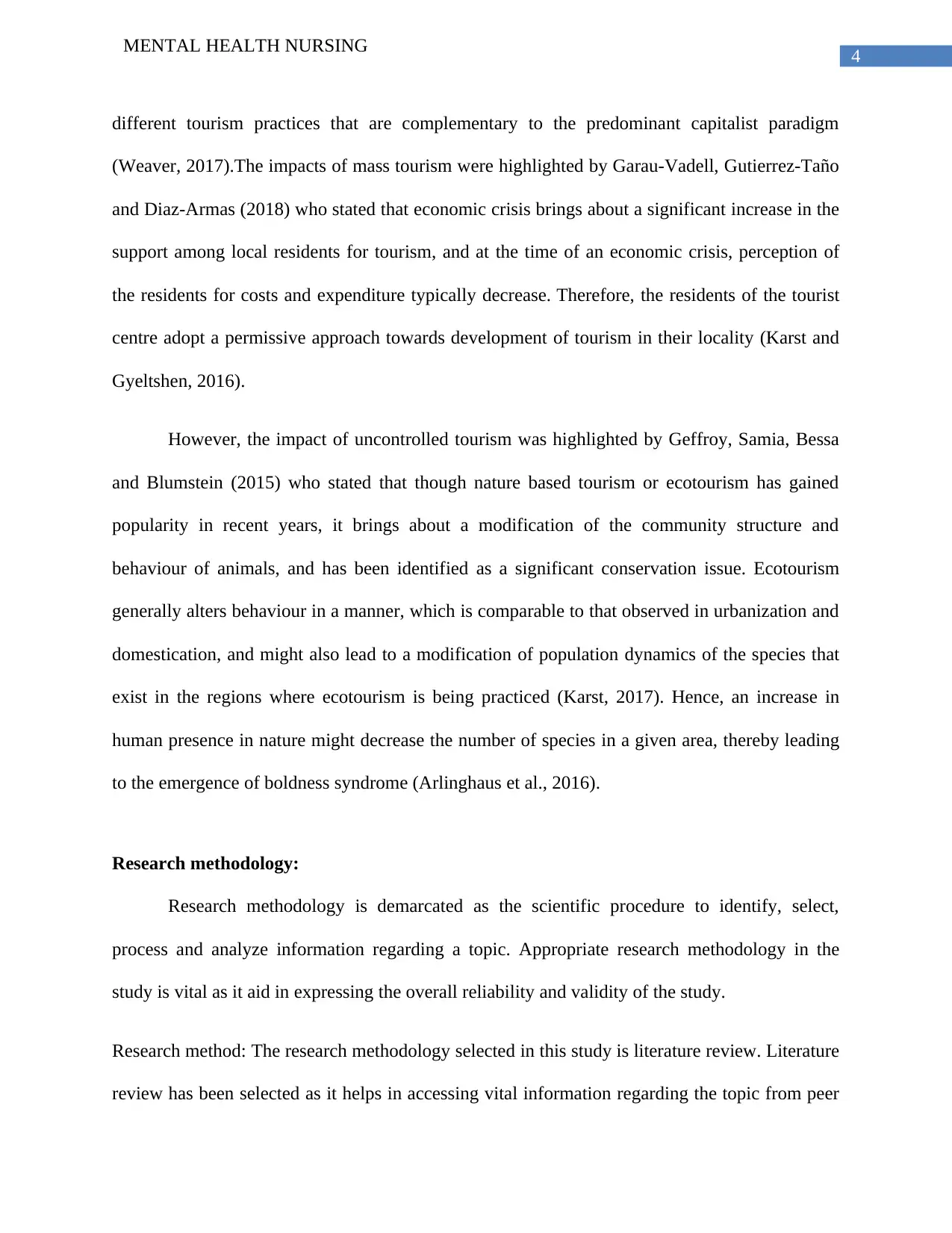
4
MENTAL HEALTH NURSING
different tourism practices that are complementary to the predominant capitalist paradigm
(Weaver, 2017).The impacts of mass tourism were highlighted by Garau-Vadell, Gutierrez-Taño
and Diaz-Armas (2018) who stated that economic crisis brings about a significant increase in the
support among local residents for tourism, and at the time of an economic crisis, perception of
the residents for costs and expenditure typically decrease. Therefore, the residents of the tourist
centre adopt a permissive approach towards development of tourism in their locality (Karst and
Gyeltshen, 2016).
However, the impact of uncontrolled tourism was highlighted by Geffroy, Samia, Bessa
and Blumstein (2015) who stated that though nature based tourism or ecotourism has gained
popularity in recent years, it brings about a modification of the community structure and
behaviour of animals, and has been identified as a significant conservation issue. Ecotourism
generally alters behaviour in a manner, which is comparable to that observed in urbanization and
domestication, and might also lead to a modification of population dynamics of the species that
exist in the regions where ecotourism is being practiced (Karst, 2017). Hence, an increase in
human presence in nature might decrease the number of species in a given area, thereby leading
to the emergence of boldness syndrome (Arlinghaus et al., 2016).
Research methodology:
Research methodology is demarcated as the scientific procedure to identify, select,
process and analyze information regarding a topic. Appropriate research methodology in the
study is vital as it aid in expressing the overall reliability and validity of the study.
Research method: The research methodology selected in this study is literature review. Literature
review has been selected as it helps in accessing vital information regarding the topic from peer
MENTAL HEALTH NURSING
different tourism practices that are complementary to the predominant capitalist paradigm
(Weaver, 2017).The impacts of mass tourism were highlighted by Garau-Vadell, Gutierrez-Taño
and Diaz-Armas (2018) who stated that economic crisis brings about a significant increase in the
support among local residents for tourism, and at the time of an economic crisis, perception of
the residents for costs and expenditure typically decrease. Therefore, the residents of the tourist
centre adopt a permissive approach towards development of tourism in their locality (Karst and
Gyeltshen, 2016).
However, the impact of uncontrolled tourism was highlighted by Geffroy, Samia, Bessa
and Blumstein (2015) who stated that though nature based tourism or ecotourism has gained
popularity in recent years, it brings about a modification of the community structure and
behaviour of animals, and has been identified as a significant conservation issue. Ecotourism
generally alters behaviour in a manner, which is comparable to that observed in urbanization and
domestication, and might also lead to a modification of population dynamics of the species that
exist in the regions where ecotourism is being practiced (Karst, 2017). Hence, an increase in
human presence in nature might decrease the number of species in a given area, thereby leading
to the emergence of boldness syndrome (Arlinghaus et al., 2016).
Research methodology:
Research methodology is demarcated as the scientific procedure to identify, select,
process and analyze information regarding a topic. Appropriate research methodology in the
study is vital as it aid in expressing the overall reliability and validity of the study.
Research method: The research methodology selected in this study is literature review. Literature
review has been selected as it helps in accessing vital information regarding the topic from peer
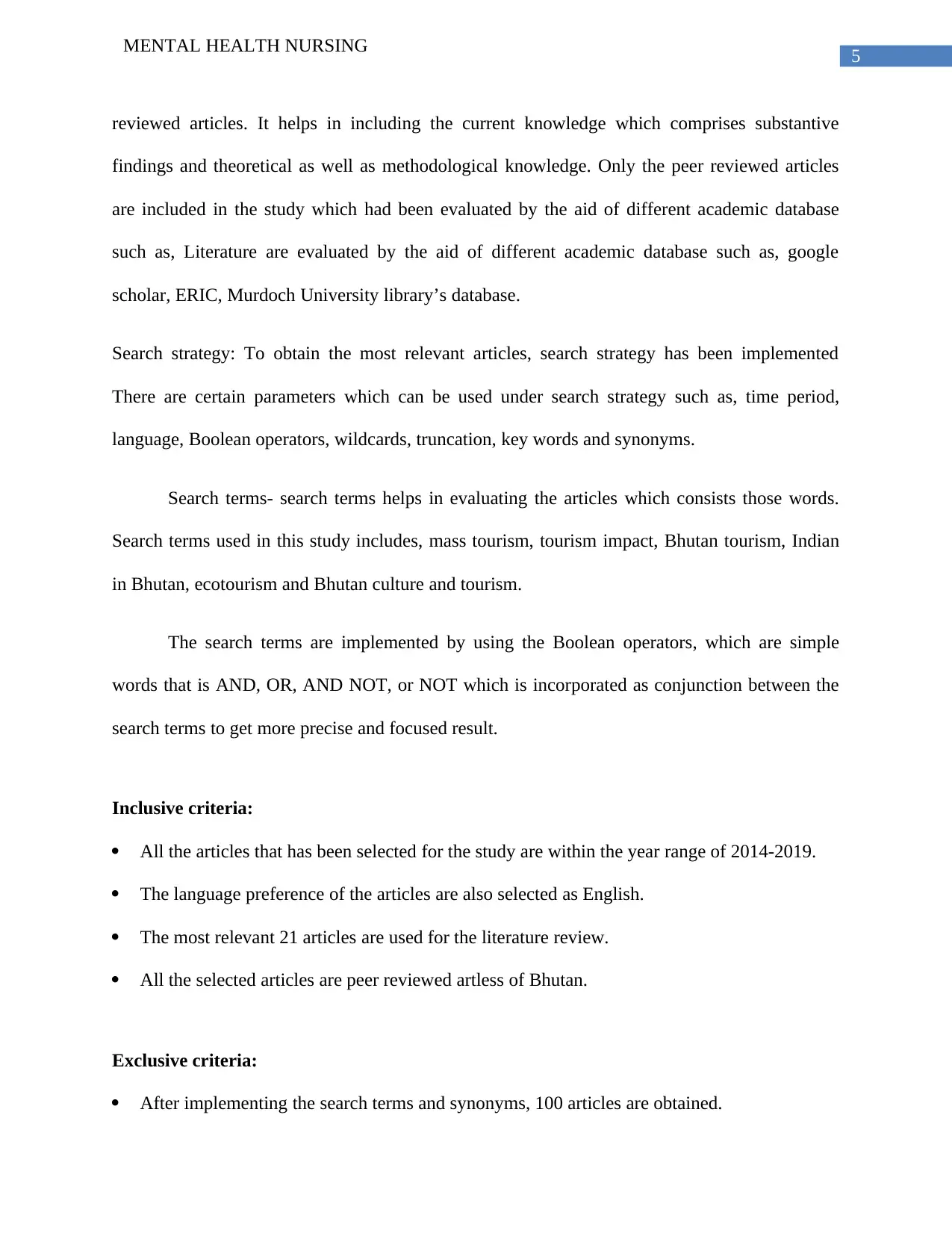
5
MENTAL HEALTH NURSING
reviewed articles. It helps in including the current knowledge which comprises substantive
findings and theoretical as well as methodological knowledge. Only the peer reviewed articles
are included in the study which had been evaluated by the aid of different academic database
such as, Literature are evaluated by the aid of different academic database such as, google
scholar, ERIC, Murdoch University library’s database.
Search strategy: To obtain the most relevant articles, search strategy has been implemented
There are certain parameters which can be used under search strategy such as, time period,
language, Boolean operators, wildcards, truncation, key words and synonyms.
Search terms- search terms helps in evaluating the articles which consists those words.
Search terms used in this study includes, mass tourism, tourism impact, Bhutan tourism, Indian
in Bhutan, ecotourism and Bhutan culture and tourism.
The search terms are implemented by using the Boolean operators, which are simple
words that is AND, OR, AND NOT, or NOT which is incorporated as conjunction between the
search terms to get more precise and focused result.
Inclusive criteria:
All the articles that has been selected for the study are within the year range of 2014-2019.
The language preference of the articles are also selected as English.
The most relevant 21 articles are used for the literature review.
All the selected articles are peer reviewed artless of Bhutan.
Exclusive criteria:
After implementing the search terms and synonyms, 100 articles are obtained.
MENTAL HEALTH NURSING
reviewed articles. It helps in including the current knowledge which comprises substantive
findings and theoretical as well as methodological knowledge. Only the peer reviewed articles
are included in the study which had been evaluated by the aid of different academic database
such as, Literature are evaluated by the aid of different academic database such as, google
scholar, ERIC, Murdoch University library’s database.
Search strategy: To obtain the most relevant articles, search strategy has been implemented
There are certain parameters which can be used under search strategy such as, time period,
language, Boolean operators, wildcards, truncation, key words and synonyms.
Search terms- search terms helps in evaluating the articles which consists those words.
Search terms used in this study includes, mass tourism, tourism impact, Bhutan tourism, Indian
in Bhutan, ecotourism and Bhutan culture and tourism.
The search terms are implemented by using the Boolean operators, which are simple
words that is AND, OR, AND NOT, or NOT which is incorporated as conjunction between the
search terms to get more precise and focused result.
Inclusive criteria:
All the articles that has been selected for the study are within the year range of 2014-2019.
The language preference of the articles are also selected as English.
The most relevant 21 articles are used for the literature review.
All the selected articles are peer reviewed artless of Bhutan.
Exclusive criteria:
After implementing the search terms and synonyms, 100 articles are obtained.
⊘ This is a preview!⊘
Do you want full access?
Subscribe today to unlock all pages.

Trusted by 1+ million students worldwide
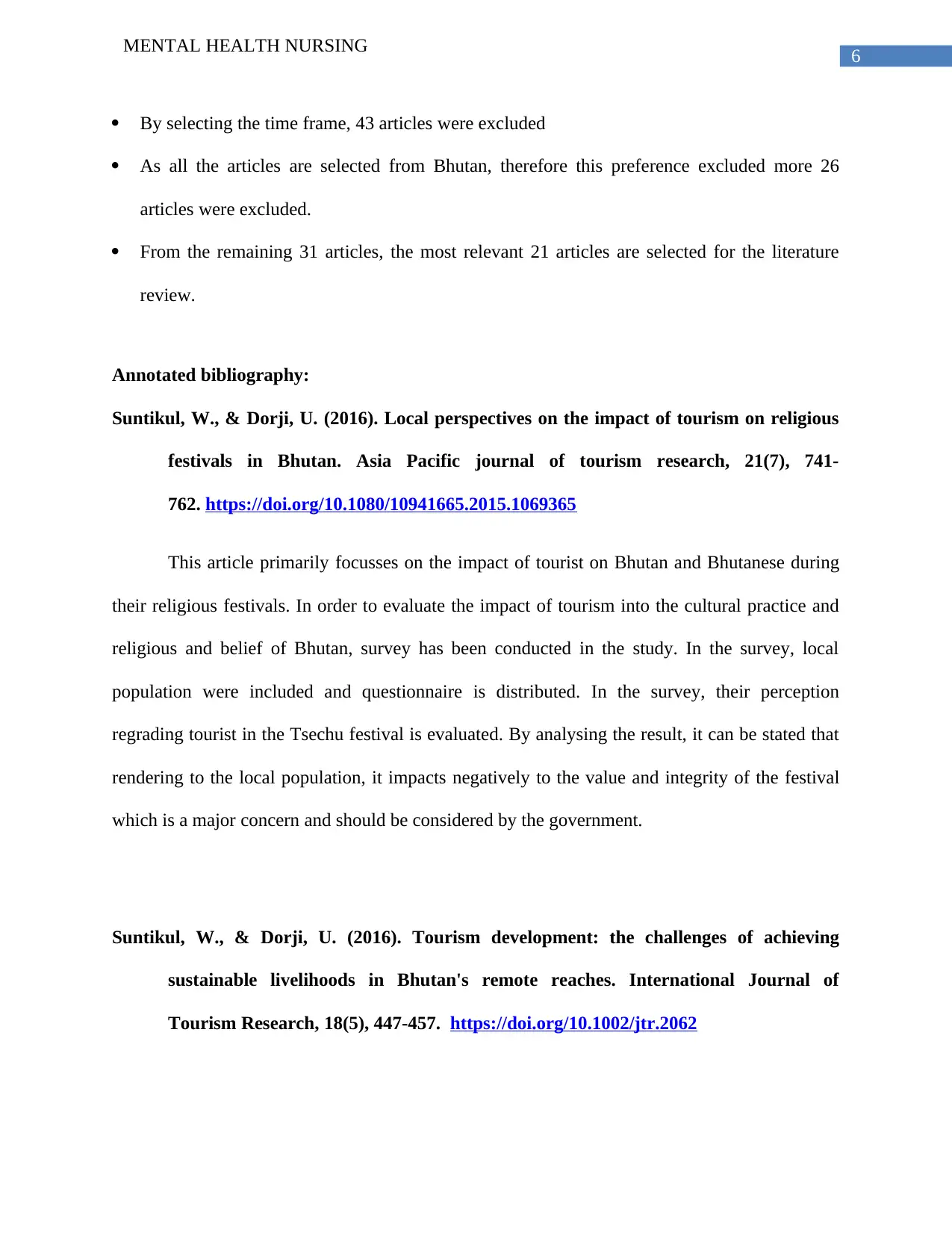
6
MENTAL HEALTH NURSING
By selecting the time frame, 43 articles were excluded
As all the articles are selected from Bhutan, therefore this preference excluded more 26
articles were excluded.
From the remaining 31 articles, the most relevant 21 articles are selected for the literature
review.
Annotated bibliography:
Suntikul, W., & Dorji, U. (2016). Local perspectives on the impact of tourism on religious
festivals in Bhutan. Asia Pacific journal of tourism research, 21(7), 741-
762. https://doi.org/10.1080/10941665.2015.1069365
This article primarily focusses on the impact of tourist on Bhutan and Bhutanese during
their religious festivals. In order to evaluate the impact of tourism into the cultural practice and
religious and belief of Bhutan, survey has been conducted in the study. In the survey, local
population were included and questionnaire is distributed. In the survey, their perception
regrading tourist in the Tsechu festival is evaluated. By analysing the result, it can be stated that
rendering to the local population, it impacts negatively to the value and integrity of the festival
which is a major concern and should be considered by the government.
Suntikul, W., & Dorji, U. (2016). Tourism development: the challenges of achieving
sustainable livelihoods in Bhutan's remote reaches. International Journal of
Tourism Research, 18(5), 447-457. https://doi.org/10.1002/jtr.2062
MENTAL HEALTH NURSING
By selecting the time frame, 43 articles were excluded
As all the articles are selected from Bhutan, therefore this preference excluded more 26
articles were excluded.
From the remaining 31 articles, the most relevant 21 articles are selected for the literature
review.
Annotated bibliography:
Suntikul, W., & Dorji, U. (2016). Local perspectives on the impact of tourism on religious
festivals in Bhutan. Asia Pacific journal of tourism research, 21(7), 741-
762. https://doi.org/10.1080/10941665.2015.1069365
This article primarily focusses on the impact of tourist on Bhutan and Bhutanese during
their religious festivals. In order to evaluate the impact of tourism into the cultural practice and
religious and belief of Bhutan, survey has been conducted in the study. In the survey, local
population were included and questionnaire is distributed. In the survey, their perception
regrading tourist in the Tsechu festival is evaluated. By analysing the result, it can be stated that
rendering to the local population, it impacts negatively to the value and integrity of the festival
which is a major concern and should be considered by the government.
Suntikul, W., & Dorji, U. (2016). Tourism development: the challenges of achieving
sustainable livelihoods in Bhutan's remote reaches. International Journal of
Tourism Research, 18(5), 447-457. https://doi.org/10.1002/jtr.2062
Paraphrase This Document
Need a fresh take? Get an instant paraphrase of this document with our AI Paraphraser
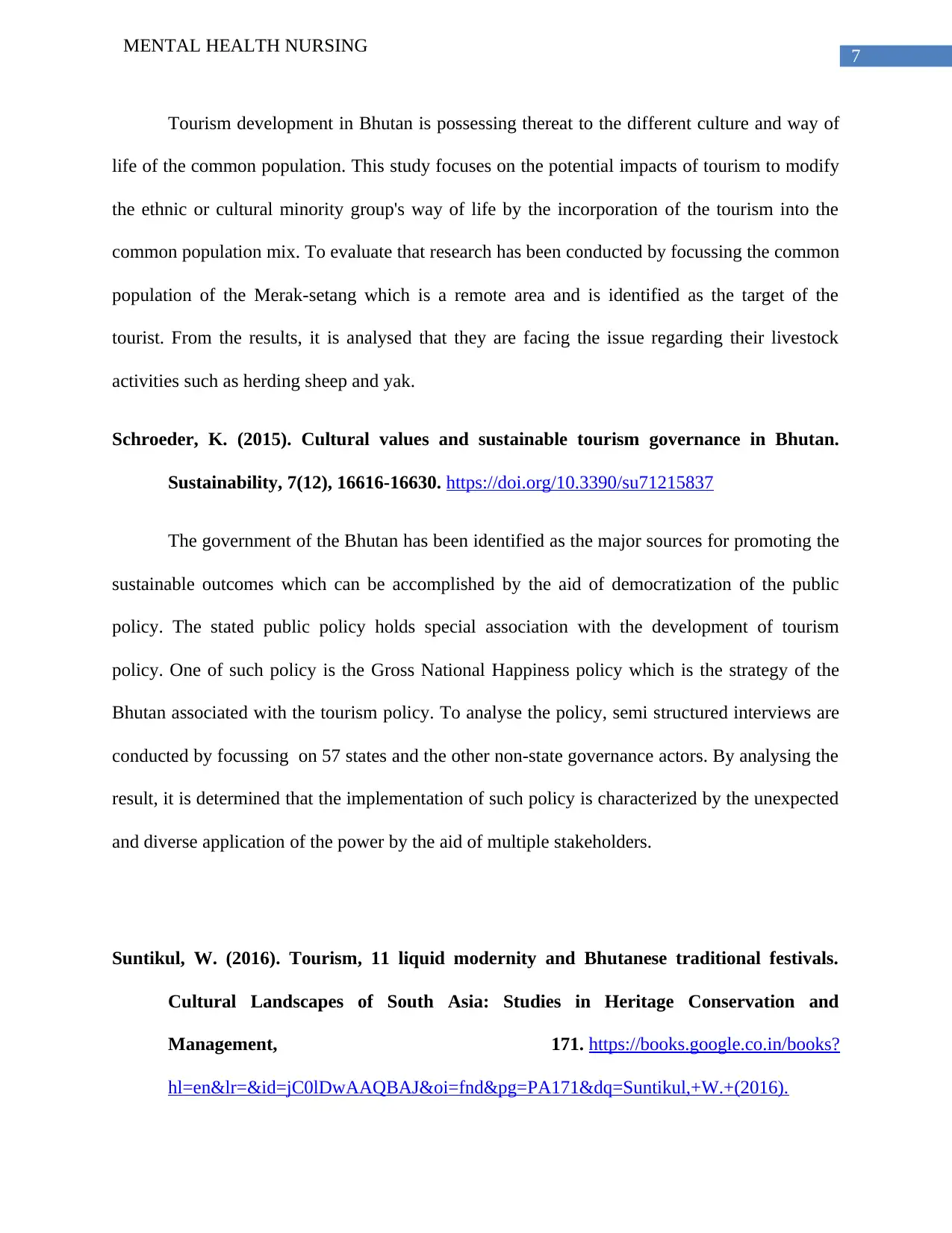
7
MENTAL HEALTH NURSING
Tourism development in Bhutan is possessing thereat to the different culture and way of
life of the common population. This study focuses on the potential impacts of tourism to modify
the ethnic or cultural minority group's way of life by the incorporation of the tourism into the
common population mix. To evaluate that research has been conducted by focussing the common
population of the Merak-setang which is a remote area and is identified as the target of the
tourist. From the results, it is analysed that they are facing the issue regarding their livestock
activities such as herding sheep and yak.
Schroeder, K. (2015). Cultural values and sustainable tourism governance in Bhutan.
Sustainability, 7(12), 16616-16630. https://doi.org/10.3390/su71215837
The government of the Bhutan has been identified as the major sources for promoting the
sustainable outcomes which can be accomplished by the aid of democratization of the public
policy. The stated public policy holds special association with the development of tourism
policy. One of such policy is the Gross National Happiness policy which is the strategy of the
Bhutan associated with the tourism policy. To analyse the policy, semi structured interviews are
conducted by focussing on 57 states and the other non-state governance actors. By analysing the
result, it is determined that the implementation of such policy is characterized by the unexpected
and diverse application of the power by the aid of multiple stakeholders.
Suntikul, W. (2016). Tourism, 11 liquid modernity and Bhutanese traditional festivals.
Cultural Landscapes of South Asia: Studies in Heritage Conservation and
Management, 171. https://books.google.co.in/books?
hl=en&lr=&id=jC0lDwAAQBAJ&oi=fnd&pg=PA171&dq=Suntikul,+W.+(2016).
MENTAL HEALTH NURSING
Tourism development in Bhutan is possessing thereat to the different culture and way of
life of the common population. This study focuses on the potential impacts of tourism to modify
the ethnic or cultural minority group's way of life by the incorporation of the tourism into the
common population mix. To evaluate that research has been conducted by focussing the common
population of the Merak-setang which is a remote area and is identified as the target of the
tourist. From the results, it is analysed that they are facing the issue regarding their livestock
activities such as herding sheep and yak.
Schroeder, K. (2015). Cultural values and sustainable tourism governance in Bhutan.
Sustainability, 7(12), 16616-16630. https://doi.org/10.3390/su71215837
The government of the Bhutan has been identified as the major sources for promoting the
sustainable outcomes which can be accomplished by the aid of democratization of the public
policy. The stated public policy holds special association with the development of tourism
policy. One of such policy is the Gross National Happiness policy which is the strategy of the
Bhutan associated with the tourism policy. To analyse the policy, semi structured interviews are
conducted by focussing on 57 states and the other non-state governance actors. By analysing the
result, it is determined that the implementation of such policy is characterized by the unexpected
and diverse application of the power by the aid of multiple stakeholders.
Suntikul, W. (2016). Tourism, 11 liquid modernity and Bhutanese traditional festivals.
Cultural Landscapes of South Asia: Studies in Heritage Conservation and
Management, 171. https://books.google.co.in/books?
hl=en&lr=&id=jC0lDwAAQBAJ&oi=fnd&pg=PA171&dq=Suntikul,+W.+(2016).
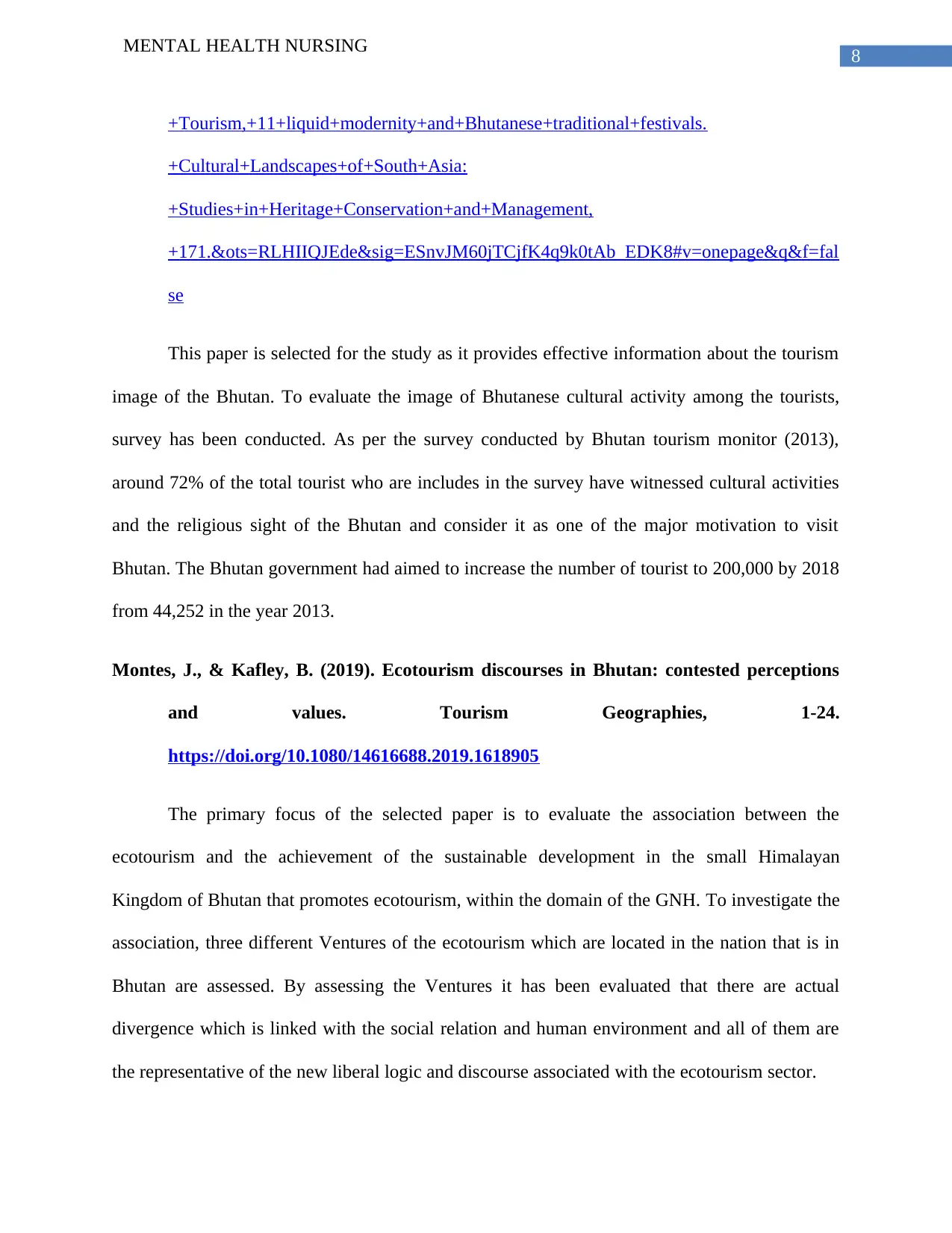
8
MENTAL HEALTH NURSING
+Tourism,+11+liquid+modernity+and+Bhutanese+traditional+festivals.
+Cultural+Landscapes+of+South+Asia:
+Studies+in+Heritage+Conservation+and+Management,
+171.&ots=RLHIIQJEde&sig=ESnvJM60jTCjfK4q9k0tAb_EDK8#v=onepage&q&f=fal
se
This paper is selected for the study as it provides effective information about the tourism
image of the Bhutan. To evaluate the image of Bhutanese cultural activity among the tourists,
survey has been conducted. As per the survey conducted by Bhutan tourism monitor (2013),
around 72% of the total tourist who are includes in the survey have witnessed cultural activities
and the religious sight of the Bhutan and consider it as one of the major motivation to visit
Bhutan. The Bhutan government had aimed to increase the number of tourist to 200,000 by 2018
from 44,252 in the year 2013.
Montes, J., & Kafley, B. (2019). Ecotourism discourses in Bhutan: contested perceptions
and values. Tourism Geographies, 1-24.
https://doi.org/10.1080/14616688.2019.1618905
The primary focus of the selected paper is to evaluate the association between the
ecotourism and the achievement of the sustainable development in the small Himalayan
Kingdom of Bhutan that promotes ecotourism, within the domain of the GNH. To investigate the
association, three different Ventures of the ecotourism which are located in the nation that is in
Bhutan are assessed. By assessing the Ventures it has been evaluated that there are actual
divergence which is linked with the social relation and human environment and all of them are
the representative of the new liberal logic and discourse associated with the ecotourism sector.
MENTAL HEALTH NURSING
+Tourism,+11+liquid+modernity+and+Bhutanese+traditional+festivals.
+Cultural+Landscapes+of+South+Asia:
+Studies+in+Heritage+Conservation+and+Management,
+171.&ots=RLHIIQJEde&sig=ESnvJM60jTCjfK4q9k0tAb_EDK8#v=onepage&q&f=fal
se
This paper is selected for the study as it provides effective information about the tourism
image of the Bhutan. To evaluate the image of Bhutanese cultural activity among the tourists,
survey has been conducted. As per the survey conducted by Bhutan tourism monitor (2013),
around 72% of the total tourist who are includes in the survey have witnessed cultural activities
and the religious sight of the Bhutan and consider it as one of the major motivation to visit
Bhutan. The Bhutan government had aimed to increase the number of tourist to 200,000 by 2018
from 44,252 in the year 2013.
Montes, J., & Kafley, B. (2019). Ecotourism discourses in Bhutan: contested perceptions
and values. Tourism Geographies, 1-24.
https://doi.org/10.1080/14616688.2019.1618905
The primary focus of the selected paper is to evaluate the association between the
ecotourism and the achievement of the sustainable development in the small Himalayan
Kingdom of Bhutan that promotes ecotourism, within the domain of the GNH. To investigate the
association, three different Ventures of the ecotourism which are located in the nation that is in
Bhutan are assessed. By assessing the Ventures it has been evaluated that there are actual
divergence which is linked with the social relation and human environment and all of them are
the representative of the new liberal logic and discourse associated with the ecotourism sector.
⊘ This is a preview!⊘
Do you want full access?
Subscribe today to unlock all pages.

Trusted by 1+ million students worldwide

9
MENTAL HEALTH NURSING
MENTAL HEALTH NURSING
Paraphrase This Document
Need a fresh take? Get an instant paraphrase of this document with our AI Paraphraser
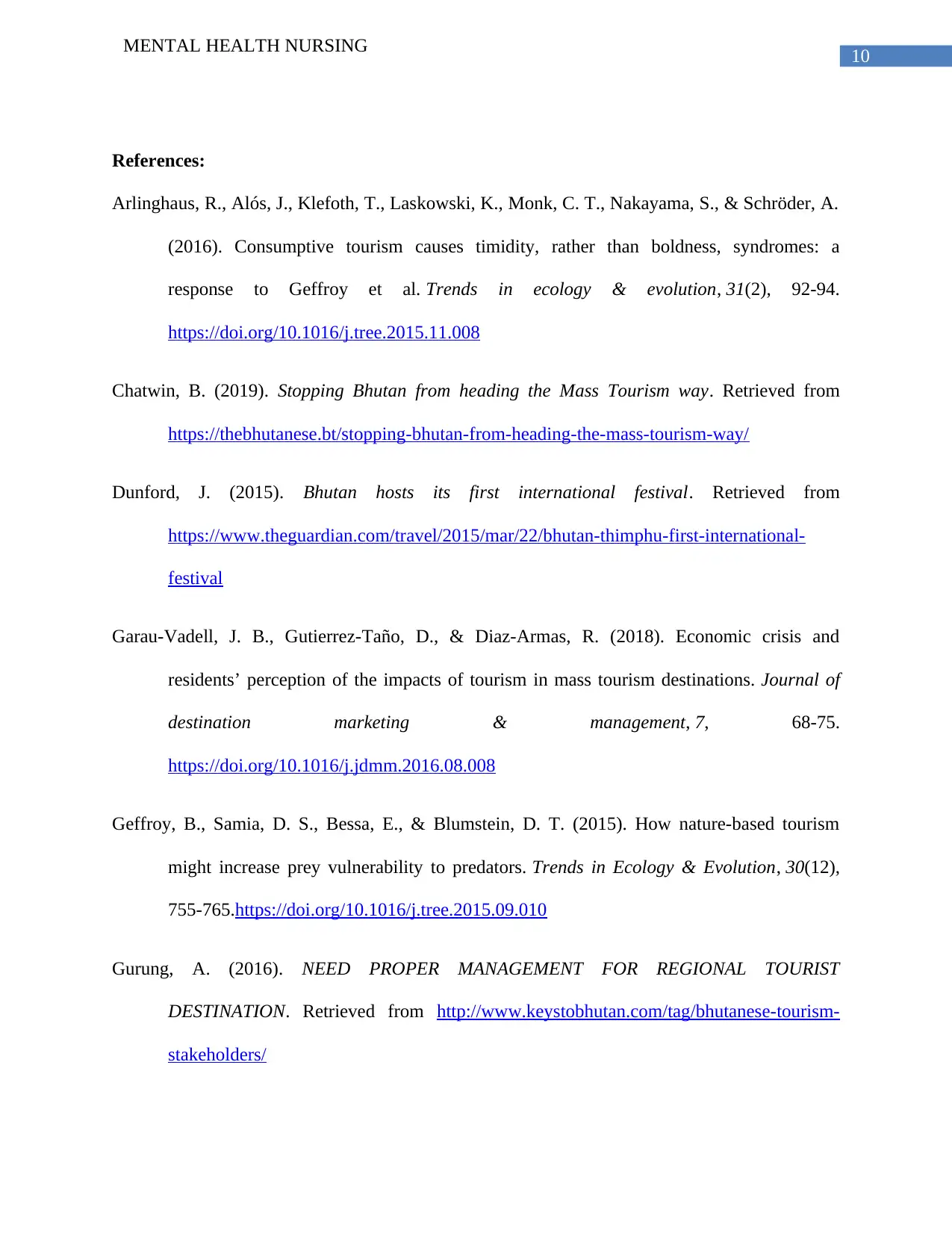
10
MENTAL HEALTH NURSING
References:
Arlinghaus, R., Alós, J., Klefoth, T., Laskowski, K., Monk, C. T., Nakayama, S., & Schröder, A.
(2016). Consumptive tourism causes timidity, rather than boldness, syndromes: a
response to Geffroy et al. Trends in ecology & evolution, 31(2), 92-94.
https://doi.org/10.1016/j.tree.2015.11.008
Chatwin, B. (2019). Stopping Bhutan from heading the Mass Tourism way. Retrieved from
https://thebhutanese.bt/stopping-bhutan-from-heading-the-mass-tourism-way/
Dunford, J. (2015). Bhutan hosts its first international festival. Retrieved from
https://www.theguardian.com/travel/2015/mar/22/bhutan-thimphu-first-international-
festival
Garau-Vadell, J. B., Gutierrez-Taño, D., & Diaz-Armas, R. (2018). Economic crisis and
residents’ perception of the impacts of tourism in mass tourism destinations. Journal of
destination marketing & management, 7, 68-75.
https://doi.org/10.1016/j.jdmm.2016.08.008
Geffroy, B., Samia, D. S., Bessa, E., & Blumstein, D. T. (2015). How nature-based tourism
might increase prey vulnerability to predators. Trends in Ecology & Evolution, 30(12),
755-765.https://doi.org/10.1016/j.tree.2015.09.010
Gurung, A. (2016). NEED PROPER MANAGEMENT FOR REGIONAL TOURIST
DESTINATION. Retrieved from http://www.keystobhutan.com/tag/bhutanese-tourism-
stakeholders/
MENTAL HEALTH NURSING
References:
Arlinghaus, R., Alós, J., Klefoth, T., Laskowski, K., Monk, C. T., Nakayama, S., & Schröder, A.
(2016). Consumptive tourism causes timidity, rather than boldness, syndromes: a
response to Geffroy et al. Trends in ecology & evolution, 31(2), 92-94.
https://doi.org/10.1016/j.tree.2015.11.008
Chatwin, B. (2019). Stopping Bhutan from heading the Mass Tourism way. Retrieved from
https://thebhutanese.bt/stopping-bhutan-from-heading-the-mass-tourism-way/
Dunford, J. (2015). Bhutan hosts its first international festival. Retrieved from
https://www.theguardian.com/travel/2015/mar/22/bhutan-thimphu-first-international-
festival
Garau-Vadell, J. B., Gutierrez-Taño, D., & Diaz-Armas, R. (2018). Economic crisis and
residents’ perception of the impacts of tourism in mass tourism destinations. Journal of
destination marketing & management, 7, 68-75.
https://doi.org/10.1016/j.jdmm.2016.08.008
Geffroy, B., Samia, D. S., Bessa, E., & Blumstein, D. T. (2015). How nature-based tourism
might increase prey vulnerability to predators. Trends in Ecology & Evolution, 30(12),
755-765.https://doi.org/10.1016/j.tree.2015.09.010
Gurung, A. (2016). NEED PROPER MANAGEMENT FOR REGIONAL TOURIST
DESTINATION. Retrieved from http://www.keystobhutan.com/tag/bhutanese-tourism-
stakeholders/
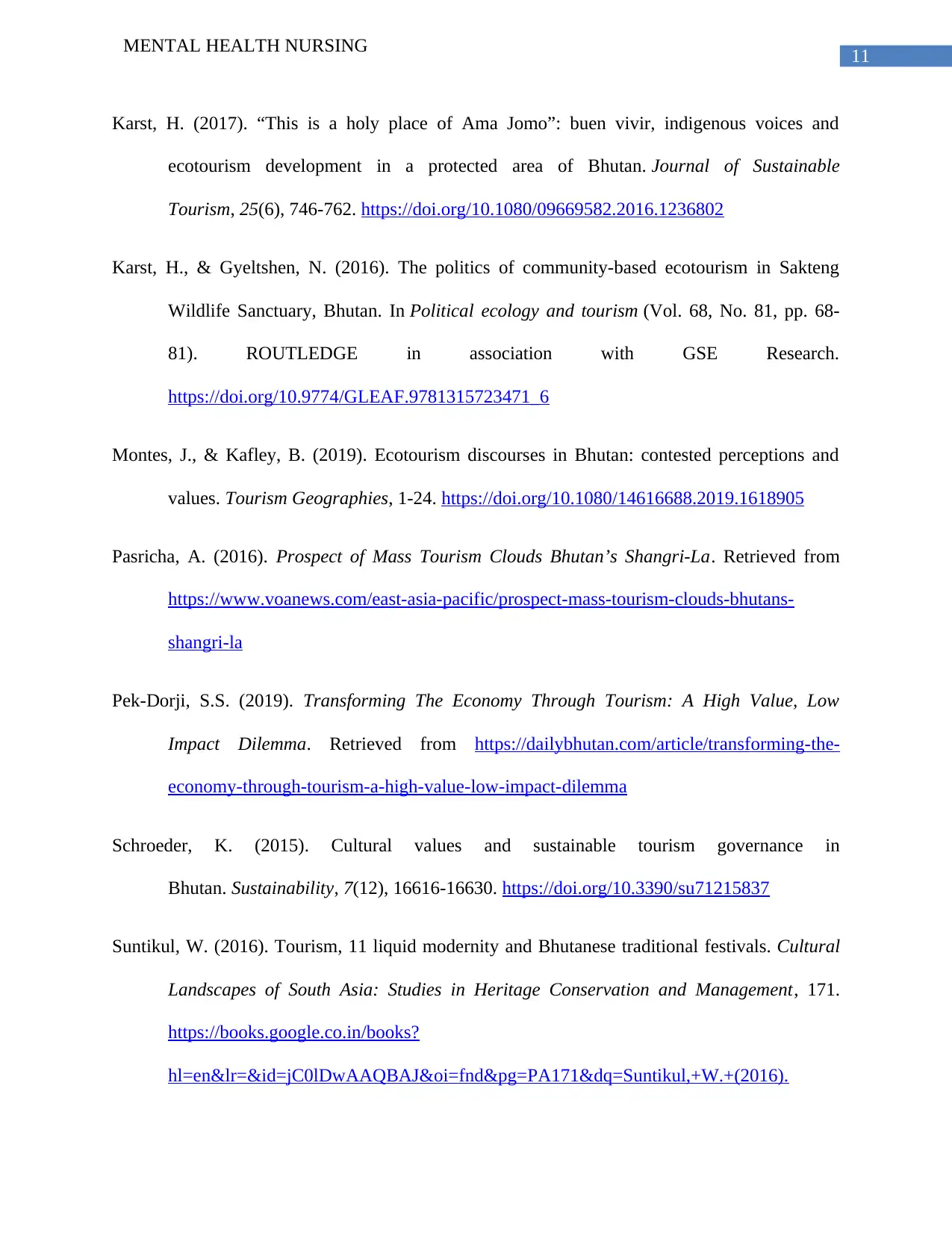
11
MENTAL HEALTH NURSING
Karst, H. (2017). “This is a holy place of Ama Jomo”: buen vivir, indigenous voices and
ecotourism development in a protected area of Bhutan. Journal of Sustainable
Tourism, 25(6), 746-762. https://doi.org/10.1080/09669582.2016.1236802
Karst, H., & Gyeltshen, N. (2016). The politics of community-based ecotourism in Sakteng
Wildlife Sanctuary, Bhutan. In Political ecology and tourism (Vol. 68, No. 81, pp. 68-
81). ROUTLEDGE in association with GSE Research.
https://doi.org/10.9774/GLEAF.9781315723471_6
Montes, J., & Kafley, B. (2019). Ecotourism discourses in Bhutan: contested perceptions and
values. Tourism Geographies, 1-24. https://doi.org/10.1080/14616688.2019.1618905
Pasricha, A. (2016). Prospect of Mass Tourism Clouds Bhutan’s Shangri-La. Retrieved from
https://www.voanews.com/east-asia-pacific/prospect-mass-tourism-clouds-bhutans-
shangri-la
Pek-Dorji, S.S. (2019). Transforming The Economy Through Tourism: A High Value, Low
Impact Dilemma. Retrieved from https://dailybhutan.com/article/transforming-the-
economy-through-tourism-a-high-value-low-impact-dilemma
Schroeder, K. (2015). Cultural values and sustainable tourism governance in
Bhutan. Sustainability, 7(12), 16616-16630. https://doi.org/10.3390/su71215837
Suntikul, W. (2016). Tourism, 11 liquid modernity and Bhutanese traditional festivals. Cultural
Landscapes of South Asia: Studies in Heritage Conservation and Management, 171.
https://books.google.co.in/books?
hl=en&lr=&id=jC0lDwAAQBAJ&oi=fnd&pg=PA171&dq=Suntikul,+W.+(2016).
MENTAL HEALTH NURSING
Karst, H. (2017). “This is a holy place of Ama Jomo”: buen vivir, indigenous voices and
ecotourism development in a protected area of Bhutan. Journal of Sustainable
Tourism, 25(6), 746-762. https://doi.org/10.1080/09669582.2016.1236802
Karst, H., & Gyeltshen, N. (2016). The politics of community-based ecotourism in Sakteng
Wildlife Sanctuary, Bhutan. In Political ecology and tourism (Vol. 68, No. 81, pp. 68-
81). ROUTLEDGE in association with GSE Research.
https://doi.org/10.9774/GLEAF.9781315723471_6
Montes, J., & Kafley, B. (2019). Ecotourism discourses in Bhutan: contested perceptions and
values. Tourism Geographies, 1-24. https://doi.org/10.1080/14616688.2019.1618905
Pasricha, A. (2016). Prospect of Mass Tourism Clouds Bhutan’s Shangri-La. Retrieved from
https://www.voanews.com/east-asia-pacific/prospect-mass-tourism-clouds-bhutans-
shangri-la
Pek-Dorji, S.S. (2019). Transforming The Economy Through Tourism: A High Value, Low
Impact Dilemma. Retrieved from https://dailybhutan.com/article/transforming-the-
economy-through-tourism-a-high-value-low-impact-dilemma
Schroeder, K. (2015). Cultural values and sustainable tourism governance in
Bhutan. Sustainability, 7(12), 16616-16630. https://doi.org/10.3390/su71215837
Suntikul, W. (2016). Tourism, 11 liquid modernity and Bhutanese traditional festivals. Cultural
Landscapes of South Asia: Studies in Heritage Conservation and Management, 171.
https://books.google.co.in/books?
hl=en&lr=&id=jC0lDwAAQBAJ&oi=fnd&pg=PA171&dq=Suntikul,+W.+(2016).
⊘ This is a preview!⊘
Do you want full access?
Subscribe today to unlock all pages.

Trusted by 1+ million students worldwide
1 out of 14
Related Documents
Your All-in-One AI-Powered Toolkit for Academic Success.
+13062052269
info@desklib.com
Available 24*7 on WhatsApp / Email
![[object Object]](/_next/static/media/star-bottom.7253800d.svg)
Unlock your academic potential
Copyright © 2020–2026 A2Z Services. All Rights Reserved. Developed and managed by ZUCOL.




